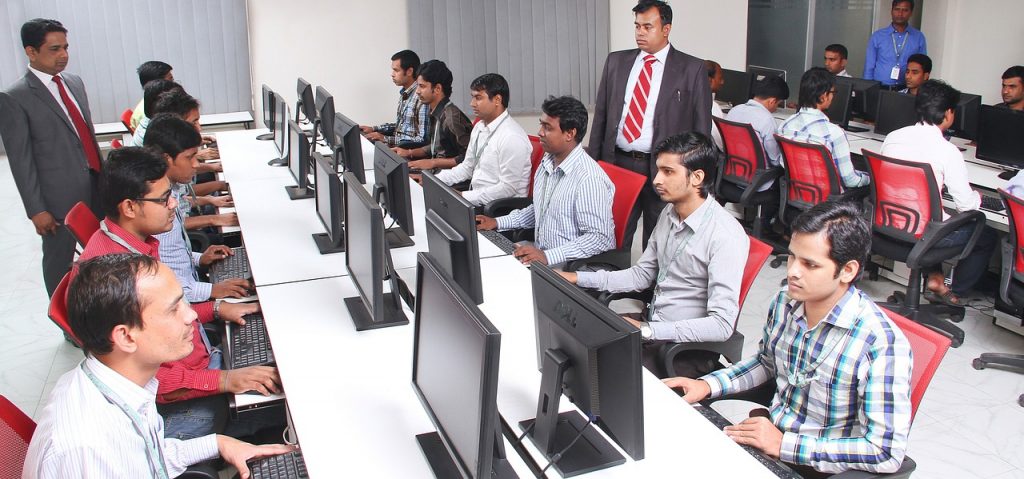As likes, clicks and followers have become more important to businesses and our lives, a whole industry has grown: click farms. You may have read about click farms, maybe via news reports that a well known celebrity inflated their followers with bought clicks, or how the proliferation of ‘fake news’ is often backed by news factories. If you’re a regular reader of this blog, you’ll have noticed that we mention click farms regularly. But, what is a click farm?
There are a couple of famous images of click farms doing the rounds online. One is from the HBO series Silicon Valley, where the final shot of one episode shows a warehouse in Bangladesh full of people clicking away on computers like a dystopian cyber-cafe.

Another shot is of a real click farm in China, with rows and rows of phones linked together and operated by a lone worker.

Although the Silicon Valley image is fiction, it is very much rooted in real life. And, of course the image of the lady with the wall of phones is taken from an actual click farm – so perhaps this is what they’re really like?
For this article, I spoke to several people who work in the paid traffic industry to find out the truth about these mysterious operations. Names of all contributors have been changed at their request.
What is a click farm?
By definition, a click farm is any location that generates internet traffic, in bulk, for a variety of purposes.
It can either be operated as a business offering a variety of digital interaction based services; or as an independent enterprise to proliferate clicks for different purposes. You might also have heard references to like farms and troll factories – which are both forms of click farms.
Click farms are easily available for hire through resellers found on the internet. This means you can pay for a person or a bot to click on or interact with whatever you want online.
Services offered by click farms can include:
- Social media followers and likes
- Posting comments on websites or social media
- Generating website traffic
- Creating backlinks
- Carrying out repetitive click based tasks
- Channelling traffic to fraudulent sites to increase rankings, domain authority or to collect payouts on display ads
- Sharing , often fake, news articles (troll factories)*
*Although the practice of troll factories has come to be well known, and they are a form of click farm, we won’t be covering them in this article as they are a whole other industry.
The click farm itself might be made up of hundreds, even thousands of people working from computer terminals, as in the Silicon Valley image.
But they are more likely to be made up of multiple devices such as phones or tablets, with a team of human operators running them.
Reselling fake clicks
James is from India but works for a US based company that resells click farm services online, focusing on business building such as backlinks and social media. He told us that one click farm that he works with in Taiwan is thought to have around 18,000 employees across 7 locations, with each location able to accommodate around one or two thousand people.
As James points out, even with all of these people, the work is usually supplemented by automated clicks from bots. Website bot traffic is usually the cheaper option, whereas if you need forms or captchas filled out or other human interaction, you can choose a more expensive package that uses humans.
Where are click farms based?
A click farm can be set up anywhere, although it does seem that Chinese click farms get a lot of the press online. This seems to be because most of the footage of click farms is from those based in China or run by Chinese teams.
The walls of phones and tablets featured in videos often also show Chinese text somewhere in there.
From our research, click farms have been revealed to be operating in:
- China
- India
- Bangladesh
- Taiwan
- Vietnam
- Kazakhstan
- Russia
- Thailand
- Venezuela
- Indonesia
- The Philippines
- South Africa
Although click farms are often found in low income countries, there are also reports of click farms in Europe and the USA.
‘Cottage industry’ click farms
Although typically click farms are often huge locations, similar to call centres, the click farm industry does allow for small operations too. Anyone can set a click farm with just one laptop and a couple of phones, or using just a few devices and a handful of people.
During my research, I found people who had run small casual click farms from their homes in the rural US and one based in Sweden. It sounded like these were very small operators who were playing with the technology and trying to make a small income rather than generating industrial scale website bot traffic.
I spoke to one operator, Hasan from Bangladesh, who explained how he ran a small click farm. He had several old phones linked to a laptop and told me he was making good money, but when Google changed their algorithms he decided to stop. “It was just a small operation… I felt like click farms were getting more illegal day by day, so I didn’t think the risk was worth it.”
But, for the big and established click farms, it’s definitely a risk worth taking. With the sheer volume of people working and the demand for paid clicks, click farm operators can make a lot of money.
Click farms and the gig economy
Click farms can also be operated with remote workers, and many sites that sell clicks outsource human click activity to freelancers. These freelancers will most likely be hired through popular outsourcing websites and can cost the click farm operators more than their in-house employees, so they’re used sparingly.
However, during 2020, the Covid-19 pandemic has created more demand for work from home jobs. One major beneficiary has been the paid-to-click (PTC) industry.
Paid-to-click sites can be accessed by anyone with an internet connected device. Once you complete a short registration, you can be clicking on banners, watching video ads and clicking on Captchas in just a few minutes.
You may only make a few pennies per click, but this can quickly add up, and for those in low income countries, the payout can be worth the time invested.
Our research here at ClickCease has found that the big PTC sites have had a busy year, paying out over $13 million to remote workers. When you consider that many of these workers are making around $10 a day from hundreds of clicks, you realise that these forms of remote click farms are generating a huge volume of fake clicks on paid ads.
Are click farms illegal?
In general, no, click farms are not illegal.
As they are mostly providing services that are technically legitimate, there is nothing to say that click farms themselves should be illegal. The vast majority of the work carried out by click farms is quite mundane; clicking likes on social posts, copy and pasting comments, following social profiles and sharing posts. At the moment, all of these actions are legal, even if they are frowned on.
There is a famous case of a click farm in Thailand being busted by police, which shows thousands of phones linked together. Although the men were arrested and the click farm shut down, they weren’t charged for operating a click farm. Police charges were focused on the immigration status of the men running the click farm, the smuggling of phones and the use of illegal unregistered SIM cards.
Click farms vs the law
The truth is that across the world there are no laws against click farms. It has been written that they are illegal in China, which normally refers to the Chinese Anti-Unfair Competition Law (AUCL). This law actually refers to the practices of stealing trade secrets and expands the scope and definition of bribery, which can now include paying a third party to give the business an ‘unfair advantage’. Read: fake reviews or clicking on paid ads. Again, this doesn’t outlaw click farms themselves but it does make some of their conduct potentially illegal if exposed. However, cases are unlikely to be taken against click farms themselves and are more likely to focus on the business that used the services.
Click worker conditions
With the majority of the world’s click farms based in countries with minimal employment and labour laws, their main legal issues are around employee rights, working conditions and wages. In fact, the conditions in most click farms are similar to those in sweatshops, but instead of making cheap garments, they’re boosting social likes, building backlinks and generating web traffic.
James tells us, “For most workers in click farms, they see it as a legitimate job… It’s hard work but it is consistent and it pays.” However, like those sweatshop workers, the pay is low. “Yes, most of these workers are on something like $10 a day… People work ten hour shifts, 24 hours a day.”
Considering that there are hundreds, if not thousands of click farms out there, raids and closures are extremely rare. And, in fact, the operations that do get closed down are those that focus specifically on fraud and are operated by organised criminals, such as the Methbot or 3ve botnet operations.
Automating clicks
Having armies of people click on social posts and links is one thing, but an easier way is to automate it. Bots are relatively easy pieces of software to create, which explains their proliferation. In fact, bots are thought to account for around half of all internet traffic, with others putting the figure as high as 60%.
When it comes to click farm activity, bots, and by extension botnets (which are a network of linked bots) have a big part to play. I spoke to Adam, a programmer from Kenya who told me about how he creates bots to generate likes on Instagram and Facebook accounts. He also uses the same bot to follow people automatically, a popular way of building up your own follower list. But interestingly, he mentioned one other type of bot that he knew about.
Home made bot farm
“My friend connected 50 phones, all running different Google accounts that click on apps and ads”, he tells me. As simple as that? “It is a quite advanced form of bot… but he uses it to collect payments on survey apps. But he makes good money from it… He needs to rotate the accounts, but he can use them to click surveys and make money easily… and they pay with PayPal or Google Play vouchers.”
Although this may seem like a comparatively simple type of fraud, it takes just a little bit of technical expertise to create a few websites to host display ads and then reroute those bots. For organised click farms these automated clicks can be extremely effective and cheap once they’re set up.
In fact, most images and videos of click farms are usually of a huge wall of phones linked together, as you’ll see below.
With even a simple click farm bot setup, you can chrun out those likes and followers at will. A quick search online shows 165,000,000 search engine results for ‘buy clicks’, so there is plenty of choice for those looking to boost their social profiles.
In fact, there is even the case of a vending machine, spotted in Russia, which offers likes and clicks on your social posts for just 50 Rubles (around $0.89c), or 100 followers for just $1.77. So you can boost your social media profile while shopping for shoes!
Click farms and click fraud
The practice of click fraud, and it’s brother ad fraud, is one that is well documented online. So how do click farms generate ad fraud, and who would need to do this?
James tells us about how some online advertisers use his service to fill their quotas, “There are some third party ad providers who can’t fulfill their order quotas for their customers… So, when the promotion is ending, they will use our services to meet their target.”
I ask him to explain, and he tells me, “These aren’t Google ads, or Facebook ads, but… Sponsored content from content providers.” I mention a couple of well known content promoters and he says, “Similar to those, but smaller companies… The content links have the analytics tracking embedded, but this can be manipulated by click farms.”
Bought traffic “isn’t fraudulent”
As James is at pains to explain though, his service isn’t fraudulent. “We always tell our clients that our traffic is not organic, but many of our competitors don’t… We don’t offer fraudulent services but there are plenty of smaller and mid level companies that do”. He even shows me the variety of services available on his website, many of which are backed by bots and click farms. There is a huge selection including app downloads and reviews, Twitter followers and retweets and even YouTube views. Many of these packages work out at pennies, or fractions of a penny, per view.
I ask him if these same click farms are likely to be a source of click fraud too.
“The click farm owners aren’t worried about what they click on, so yes certainly the same click farms that we use for legitimate means will also do this”, he says.
But as we’ve also seen, you don’t need a click farm to generate those clicks. A savvy programmer anywhere in the world can buy a few old phones and run bots day and night to make money in a variety of ways.
The techniques used by click farms
Modern Asian click farms have been running their business for years and have become extremely advanced. They have an understanding of how the advertising platform algorithms work, and use a variety of practices to get around being banned or spotted.
Adam, the Kenyan bot programmer tells me, “You have to be careful because if your bot is too active you can get banned. So you use software to change IP and MAC addresses… If you have multiple accounts, you can switch between them every few hours.”
James explains further, “We have different quality bots which we use for social following packages. Often the cheaper packages have simpler bots which will eventually be spotted by Instagram or Twitter and be banned. But, we also have bots which are used with more advanced algorithms (and) those followers will last longer.”
If you pay for website traffic, you can specify where it comes from, but it will most likely come from one of these huge click farms. The website that James sells his services through offers a choice between Global or US traffic, with the US traffic often more than double the price. I ask if this is actually click farm traffic. “Yes”, he says, “But via VPN so the location still shows as USA.”

The growth of click farms and demand for clicks
As James says, “I’ve been working in this industry for about 7 years and in that time it has grown so much. We used to be one of the only companies offering this service, now it’s saturated.”
One aspect of this is that there is so much more to click on. Social networks have grown in importance for business, and there are more of them than ever before. From Facebook and Twitter, we now have Snapchat, TikTok, Telegram, Quora, Reddit and Twitch among others.
“Engagement is value”
Engagement is a badge of trust and an endorsement, so even a thousand followers can be worth a lot to a small business owner. Likewise, reviews are more important than ever and the practices and industry around creating site backlinks are booming.
And among all this the trend for fraudulent clicks on paid links, or click fraud, has gone from niche practice to almost par for the course. It’s no coincidence that the proliferation of click farms has gone hand in hand with ever increasing fraudulent clicks.
Companies have become savvy to the fact that they can game the system and deplete their competitors ad revenue by using fraudulent practices.
Zack Shipman, senior consultant at ClickCease says, “We’ve seen a growth in customer signups of 300% in two years. This shows both an increase in awareness and also of the volume of traffic that is out there… We’ve also found that customers that signup tend to stay signed up for an extended period. In fact, many of our customers come to us and tell us they’re shocked about the amount of fraudulent traffic out there.”
What does the future hold?
Even during the coronavirus pandemic, click farm activity has been continuing. James mentioned that most click farms in Vietnam and Taiwan have had to follow lockdown laws, with services focusing on bot traffic.
At ClickCease, during March and April 2020, we have noticed that a lot of fraudulent traffic is routing through proxy servers in Europe which suggests lots of VPNs and bot traffic. Although there has been a slight decrease in fraudulent traffic overall during this time, we are still seeing plenty of fake clicks on paid ads.
The demand for web traffic
As we’ve seen, the demand for clicks is huge, with massive click farms working around the clock to meet demand. Even in the post-coronavirus world, we can expect that fake clicks are going to be as valuable as ever, perhaps more so as businesses struggle to rebuild.
The ad networks do offer some level of basic protection from automated or fraudulent traffic. But if you’re paying for clicks, and those clicks are anything from $5 to $50 each, you want to be sure that you’re paying for a genuine potential customer, not a bot or a click farm worker.
Zack at ClickCease says, “If all Google Ads users knew about click fraud and the impact of fake traffic, they would definitely sign up for a diagnostic to see how much they are affected.”
You can sign up for a free trial of ClickCease to find out for yourself how much automated or fraudulent traffic there is on your PPC ads.
